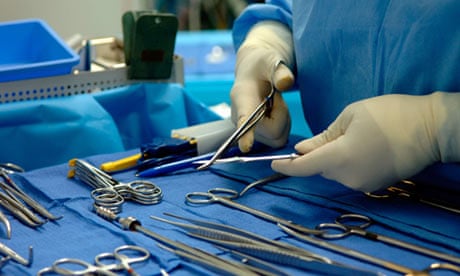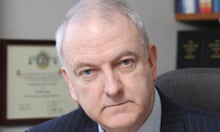Hospitals will face financial penalties if they fail to give patients with problems such as a stroke or heart attack the best possible care, under controversial plans spelled out by the NHS's top doctor.
Professor Sir Bruce Keogh, speaking to the Guardian, said the new GP-led clinical commissioning groups (CCGs) that will take control of £65bn of health spending on Monday will hold back from a hospital part of the fees for an operation if the patient has not been treated to the highest possible standards. "The idea is that the CCG would say: 'We will withhold a certain amount of payment from you until you can demonstrate that you've met these standards.' So it's a bit like the building industry – you pay 90% of the [cost of] the building upfront, and then the final payments comes a bit later, when you're sure everything is OK," Keogh said in his only interview before the new NHS system starts in England on 1 April.
Such differential payments – it is hoped – will compel hospitals to provide high-quality care and force units that do not embrace the latest medical thinking in their specialism to overhaul what they do. Medical teams that do not implement the latest clinical guidance – called quality standards – on how to manage those with a particular condition will forfeit an as yet to be agreed part of the payment.
Hospitals should view the new payment system as carrots rather than sticks, Keogh said. "So the idea for commissioning quality and innovation is to withhold a little bit of money. It's not a penalty, but it's an incentive to make sure that people reach a set of standards."
His tough message to hospitals on quality of care was reinforced by the decision late on Thursday to suspend children's heart surgery in Leeds General Infirmary following concerns about the quality of lifesaving procedures offered there and the number of its patients who died. An inquiry into practice at LGI has begun.
On Monday, the new NHS Commissioning Board takes over the day-to-day running of the NHS in England from the Department of Health as part of the coalition's radical shakeup of the service instigated by Andrew Lansley after the 2010 election. It intends to use what Keogh called its "financial muscle" – its £95.6bn budget – to make all hospitals abide by quality standards covering 180 different conditions and procedures.
He also wants to explore how differential payments could be used to tackle variation in the quality of care provided by GPs. That could mean part of the money that GP practices receive in future would depend on how many patients they diagnosed correctly or how many for whom they organised home-based care rather than in hospital.
Keogh, the board's national medical director, said the quality standards, drawn up by the National Institute of Health and Clinical Excellence, were "quite gold-plated and do represent best practice". The new CCGs will write them into contracts they sign with local hospitals for providing certain types of care to make receipt of the full payment conditional on them being followed.
The NHS Confederation, which represents hospitals, voiced unease at the plan. It would be better to give high-performing hospitals small bonuses over and above the full tariff rather than use penalties against the weaker ones, said Mike Farrar, its chief executive and a former boss of the NHS's north-west region.
"Bruce is right that commissioners [CCGs] need to use levers. But the downside of penalties is that if hospitals don't reach the standards set, then they don't get the rest of the tariff fee and the risk is of a downward spiral in which they have less resources next year in which to try and meet the standards," Farrar said.
In the Guardian interview Keogh urged the NHS to help stick to its tight spending limits by cracking down on patients receiving unnecessary tests and procedures – known as "overtreatment".
He voiced concern that the NHS is conducting too many x-rays and blood tests without a good medical reason, subjecting some patients to operations they do not need, and prescribing too many antibiotics.
"[By] giving people antibiotics when they have just got a viral infection ... you're treating a psyche; you're not treating an infection. That's a waste of money and clinically utterly useless – it's worse than useless, actually, because it's dangerous" owing to the growing number of infections that were immune to most antibiotics, he said.
He also defended the NHS and its workforce following the barrage of criticism they have faced recently, especially since last month's report into the Mid Staffs scandal. "What is unfair is the impression that the whole NHS is bad. In a system as big as our NHS there will inevitably be bad pockets, but there will be huge areas of excellence and massive areas that are good," he said.
He sprang to the defence of Sir David Nicholson, the new board's chief executive, whom MPs, Mid Staffs victims' relatives and some newspapers want to resign for failing to detect and stop the scandal in its early days.
"We have to separate the myth from the man. David Nicholson is seen by many people as very, very tough, and indeed he is. He's very good at keeping a grip on the finances of the NHS. If we get the finances wrong, patients suffer. I also hear accusations that David Nicholson is not caring. That's not my experience."




Comments (…)
Sign in or create your Guardian account to join the discussion